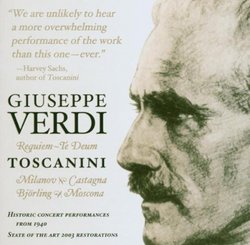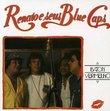An ESSENTIAL Item for the Toscanini Collector!
09/17/1998
(5 out of 5 stars)
"Most of the Music & Arts transfers of Toscanini broadcasts are in the highest possible "in house" quality of sound, as typified by this magnificent issue, which should rise to the top of the heap of all Toscanini releases of the Verdi "Requiem".Though the later 1951 broadcast (with corrections from the dress rehearsal) of the Requiem is contained in the "authorized" and "official" RCA / BMG Toscanini Collection (Vol. 63), the reading is overly- aggressive and harsh, defaced as it is by the excessive use of an RCA audio peak limiter during its original recording: the massive drum beats and climaxes are severely "squashed", and the sonic balances and tipped to the upper midrange. Toscanini is not as relaxed and lyrical as he is in this supremely satisfying 1940 account, which should be in EVERY music lover's historic performance collection. The broadcast on the present CD was taken down by RCA engineers while the music magically unfolded to the audience in Carnegie Hall: obviously it was thought that such a huge, massive work would benefit from the acoustic of a 'real' concert auditorium, so Studio 8-H was not used, to the eternal gratitude of music lovers who can revel in the richness and warmth of this recording. There are no highs above about 6 kHz, and some slight surface noise or distortion on occasion: no Cedar filtering or excessive re- equalization has been used, so the transfer sounds immediate and refreshingly accurate in its genuine solid mono.But even an audiophile would not be disappointed with this recording, if she or he truly loved the Requiem, for this is indeed one of the most stunning and perfect recreations of it that has ever been captured on a record: the soloists and chorus sing like angels, and the orchestra and Toscanini give their utmost in devotion and energy, without going over the line as they did in the 1951 version.The affecting "Te Deum" was, as I recall, not included in the actual broadcast of 23 November 1940, but was played immediately before the Requiem for the concert audience at Carnegie Hall: Toscanini favored this pairing and did it several times. The reading is as grave and powerful as the valedictory performance at one of his last NBC concerts (Vol. 62 of the RCA / BMG Collection) though it seems more spontaneous and yet better- controlled in this earlier broadcast.DO NOT fail to get this recording; please avoid any other transfer that may appear on one of those cheap import labels that add all kinds of phony stereo and mushy filtering. 5 stars and 5 "huzzahs"!"
Toscanini's best Verdi Requiem
Robert E. Nylund | Ft. Wayne, Indiana United States | 10/23/2003
(4 out of 5 stars)
"I have heard a recording of this broadcast concert and, despite some surface noise from the original source, it was clear that this may be the best recorded performance by Toscanini of the Verdi "Requiem." I can't imagine why RCA Victor never issued this. Of course, they reportedly only issued recordings that Toscanini approved and there's some evidence that he wasn't always the best judge of his recordings. Certainly the 1951 concert recording, also from Carnegie Hall, has better fidelity, but this is clearly the better performance. It also has a better "cast," especially Jussi Bjoerling, the gifted Swedish tenor (and a classic "prima donna"), in the "Ingemisco." The Westminster Choir, who often worked with Toscanini prior to his associations with Peter Wilhousky and Robert Shaw, are a plus in this performance. The NBC Symphony is in top form, too.Yes, it's good that the concert took place in Carnegie Hall, rather than Studio 8-H. Actually, Toscanini's longtime record producer, Charles O'Connell, said (in his memoirs) that they recognized (even in the 1940's) that Carnegie Hall was a better locale for recordings, so many of the "studio" recordings took place there, rather than at Radio City. A few NBC concerts were also held in Carnegie Hall, which became the regular home of the NBC Symphony in the fall of 1950, when Studio 8-H was remodeled into a television studio.I have long admired Toscanini's March 1954 concert broadcast of Verdi's "Te Deum" and I'm sure that this earlier version is every bit as good. This was Verdi's last completed work and it apparently had special meaning to the Maestro. Long sections of it are a capella and it is very powerful, deeply spiritual work."


 Track Listings (3) - Disc #1
Track Listings (3) - Disc #1